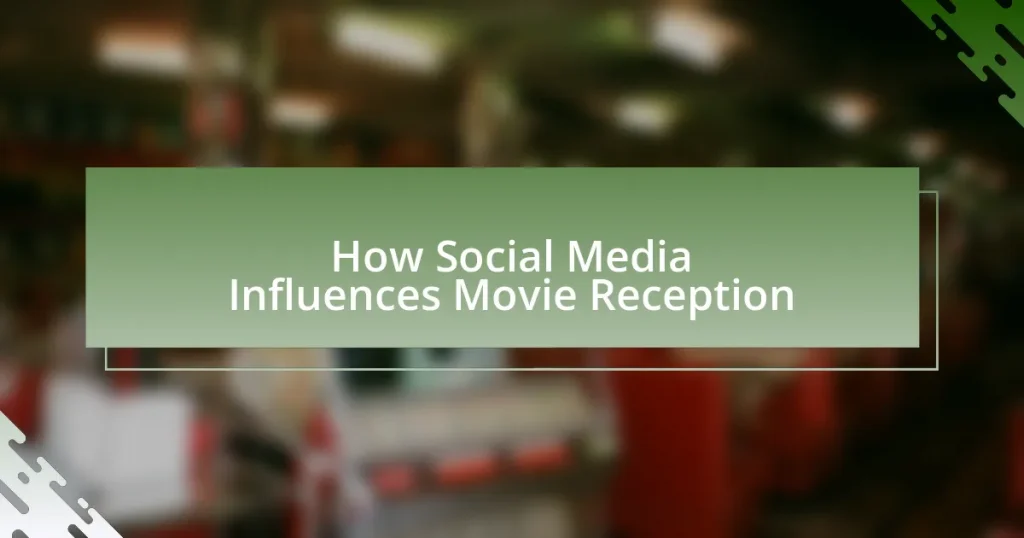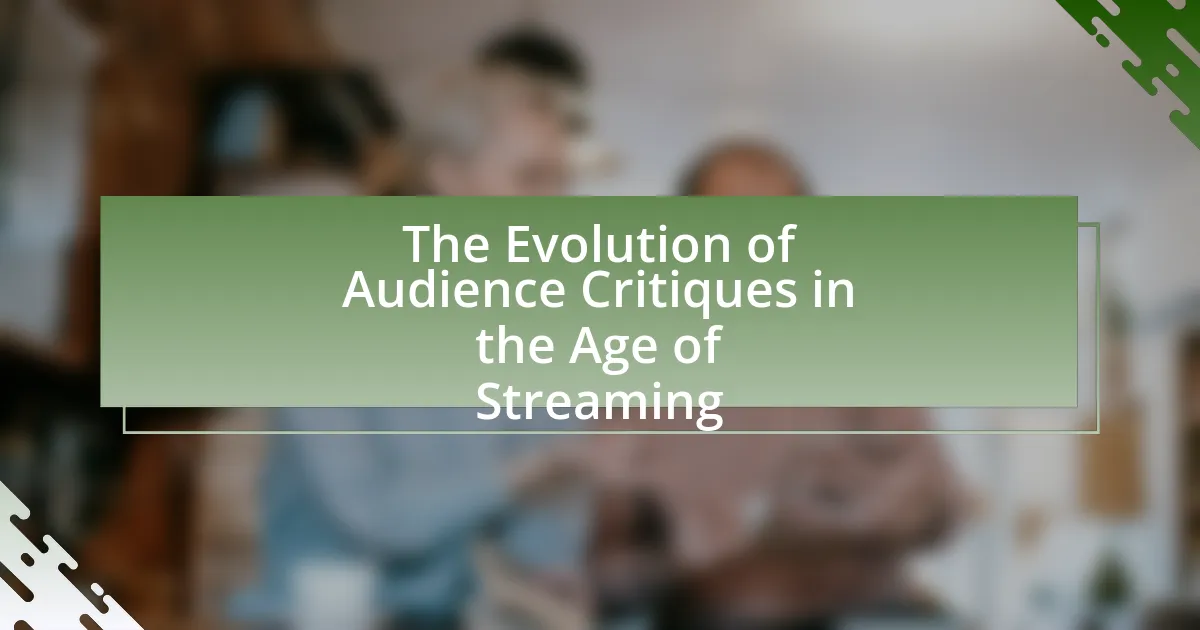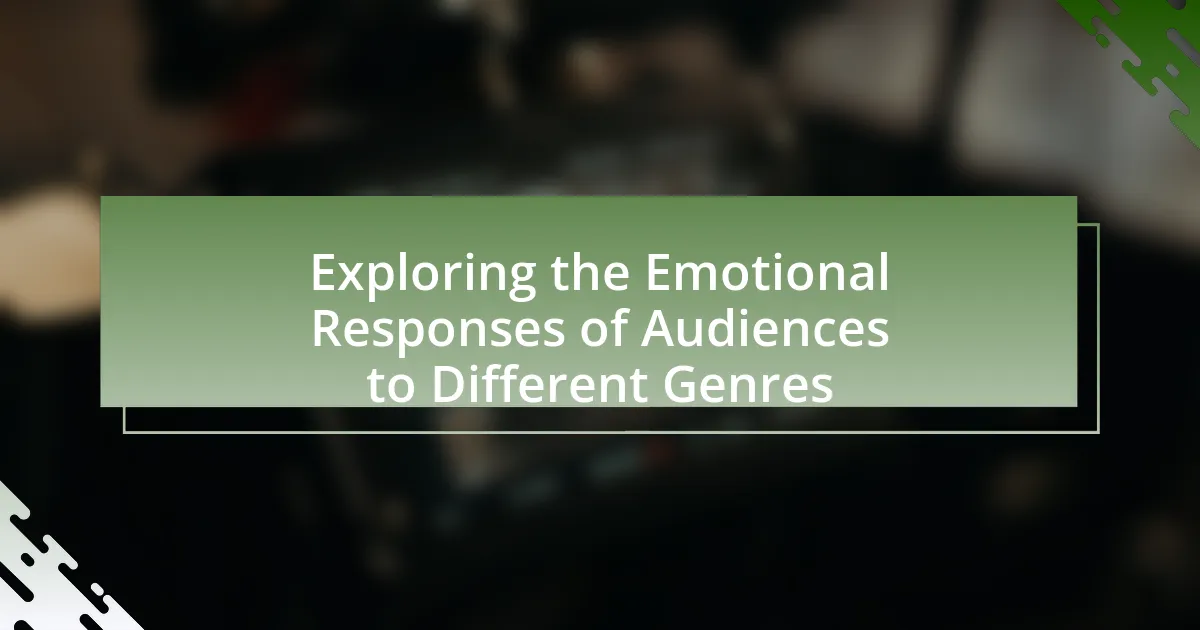The article examines how social media influences movie reception, highlighting its role in shaping audience perceptions, marketing strategies, and box office performance. It discusses the impact of immediate feedback and user-generated content on public opinion, as well as the effectiveness of influencer marketing and celebrity endorsements in promoting films. Key metrics for measuring social media influence, such as engagement rates and sentiment analysis, are outlined, along with best practices for filmmakers to enhance audience engagement and mitigate negative feedback. The article also explores future trends in social media’s role in movie marketing and audience interaction.
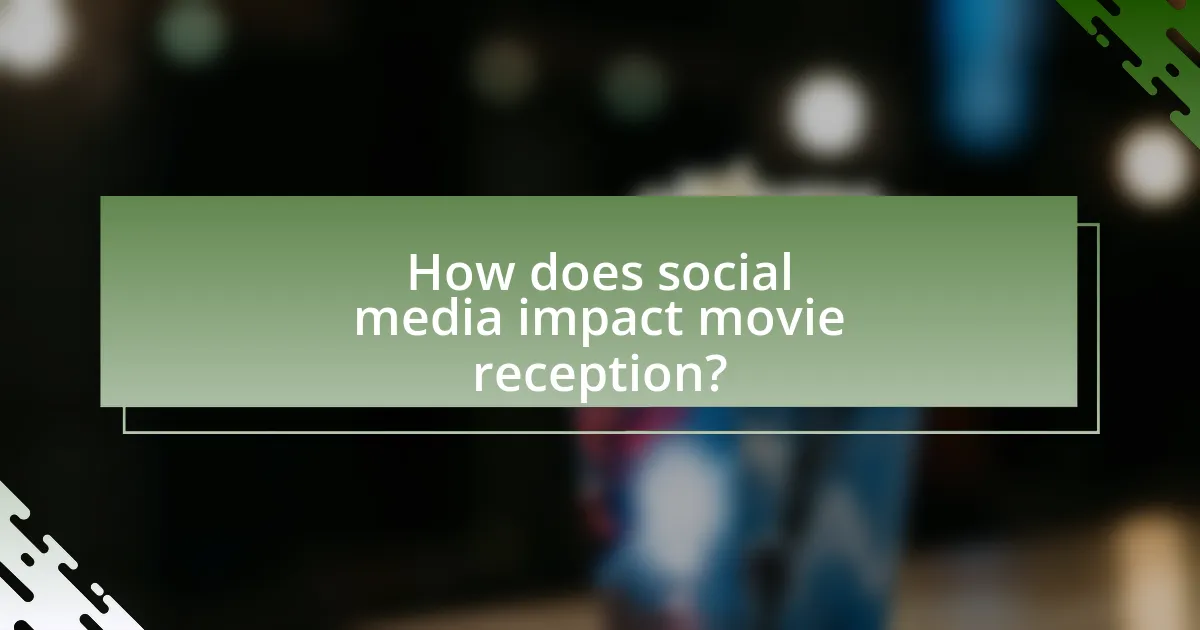
How does social media impact movie reception?
Social media significantly impacts movie reception by shaping audience perceptions and influencing box office performance. Platforms like Twitter, Facebook, and Instagram facilitate immediate feedback and discussions, allowing viewers to share their opinions and experiences with a wide audience. For instance, a study by the University of Southern California found that positive social media buzz can lead to a 20% increase in box office revenue for films. Additionally, viral marketing campaigns on social media can create anticipation and drive ticket sales, as seen with films like “Deadpool,” which utilized social media effectively to engage fans and generate excitement prior to release.
What role does social media play in shaping audience perceptions of films?
Social media significantly influences audience perceptions of films by facilitating immediate access to reviews, trailers, and audience reactions. Platforms like Twitter, Instagram, and Facebook allow users to share opinions and experiences, which can create buzz or backlash around a film. For instance, a study by the Pew Research Center found that 64% of adults use social media to discover new films, indicating its role in shaping initial perceptions. Additionally, user-generated content, such as fan art and memes, can enhance engagement and alter the narrative surrounding a film, further impacting how audiences perceive its quality and relevance.
How do social media platforms influence movie marketing strategies?
Social media platforms significantly influence movie marketing strategies by enabling direct engagement with audiences and facilitating targeted advertising. These platforms allow filmmakers and studios to create buzz through trailers, behind-the-scenes content, and interactive campaigns, which can lead to increased audience anticipation and ticket sales. For instance, a study by the University of Southern California found that films with active social media campaigns saw a 20% increase in opening weekend box office revenue compared to those without. Additionally, platforms like Twitter and Instagram provide real-time feedback and analytics, allowing marketers to adjust their strategies based on audience reactions and preferences. This dynamic interaction enhances brand loyalty and fosters a community around the film, ultimately shaping its reception and success in the market.
What are the effects of user-generated content on movie reviews?
User-generated content significantly impacts movie reviews by shaping public perception and influencing audience decisions. This content, often found on platforms like social media and review sites, provides diverse opinions that can either enhance or diminish a film’s reputation. For instance, a study by the University of Southern California found that user-generated reviews can sway potential viewers, with 79% of respondents indicating they trust online reviews as much as personal recommendations. Additionally, films with higher user ratings tend to perform better at the box office, demonstrating a direct correlation between user-generated content and commercial success.
Why is social media engagement important for movie success?
Social media engagement is crucial for movie success because it directly influences audience awareness, interest, and ticket sales. High levels of engagement on platforms like Twitter, Instagram, and Facebook create buzz and anticipation around a film, leading to increased visibility. For instance, a study by the University of Southern California found that films with strong social media campaigns can see a 20% increase in box office revenue compared to those with minimal online presence. This correlation highlights how effective social media strategies can enhance a movie’s reach and ultimately contribute to its financial success.
How do social media interactions correlate with box office performance?
Social media interactions positively correlate with box office performance, as higher engagement levels often lead to increased ticket sales. For instance, a study by the University of Southern California found that a 10% increase in social media buzz can result in a 3% increase in box office revenue. This relationship is evident in films like “Deadpool,” which generated significant online discussions and subsequently achieved a record-breaking opening weekend. The data indicates that films with robust social media campaigns tend to perform better financially, highlighting the importance of online engagement in driving audience interest and attendance.
What metrics are used to measure social media influence on movies?
Metrics used to measure social media influence on movies include engagement rates, sentiment analysis, reach, and share of voice. Engagement rates quantify interactions such as likes, shares, and comments on movie-related posts, indicating audience interest and involvement. Sentiment analysis assesses the emotional tone of social media conversations, revealing public perception of a film. Reach measures the total number of unique users exposed to movie content, while share of voice compares a movie’s social media presence against competitors, highlighting its visibility in discussions. These metrics collectively provide insights into how effectively social media impacts movie reception and audience engagement.
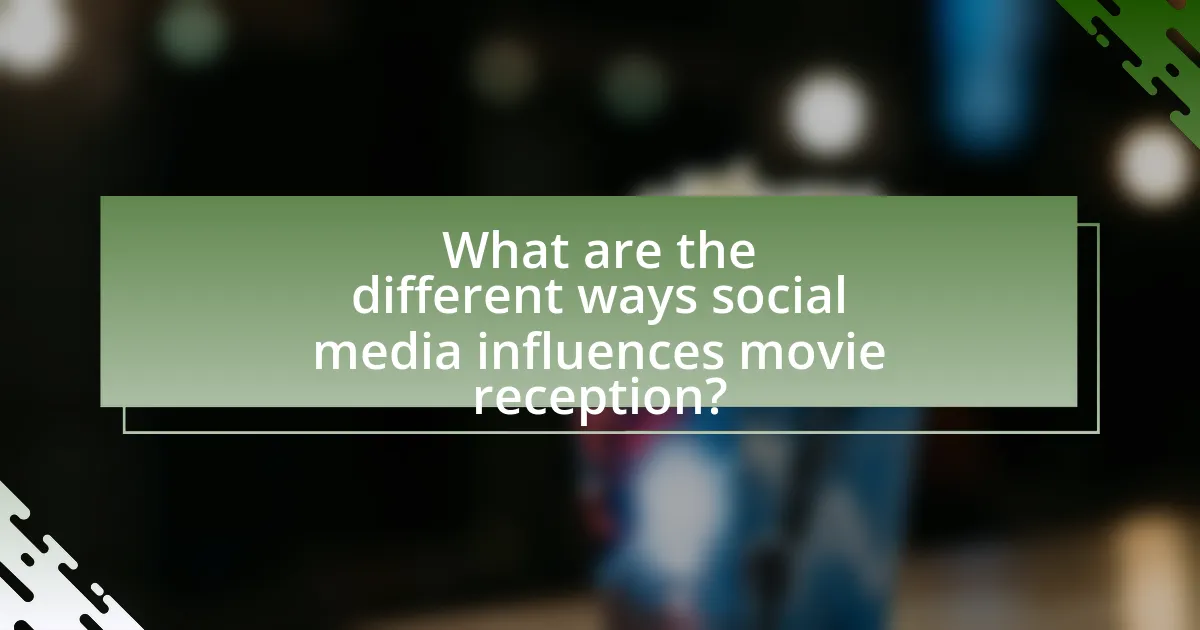
What are the different ways social media influences movie reception?
Social media influences movie reception through audience engagement, marketing strategies, and critical feedback. Audience engagement occurs as platforms like Twitter and Instagram allow fans to share opinions, create buzz, and generate anticipation before a film’s release. For instance, films like “Black Panther” saw significant online discussions that contributed to its box office success. Marketing strategies leverage social media for targeted advertising and viral campaigns, exemplified by the “Deadpool” marketing campaign, which utilized humor and memes to attract viewers. Additionally, critical feedback on platforms such as Rotten Tomatoes and IMDb shapes public perception, as user reviews and ratings can significantly impact a film’s reception, evidenced by the correlation between high ratings and box office performance.
How do influencers and celebrities affect movie promotion on social media?
Influencers and celebrities significantly enhance movie promotion on social media by leveraging their large followings to create buzz and engagement around films. Their endorsements can lead to increased visibility, as posts featuring trailers, behind-the-scenes content, or personal reviews often reach millions of followers, amplifying the film’s reach. For instance, a study by the American Psychological Association found that social media influencers can drive up to 10 times more engagement than traditional advertising methods, demonstrating their effectiveness in capturing audience attention. Additionally, when celebrities share their excitement about a movie, it can create a sense of authenticity and trust, encouraging fans to watch the film.
What strategies do filmmakers use to leverage influencer marketing?
Filmmakers leverage influencer marketing through strategic partnerships, targeted content creation, and audience engagement. By collaborating with influencers who align with their film’s themes, filmmakers can tap into established audiences, enhancing visibility and credibility. For instance, influencers often share exclusive behind-the-scenes content or participate in promotional events, which can generate buzz and anticipation among their followers. Additionally, data shows that 49% of consumers rely on influencer recommendations when making purchase decisions, highlighting the effectiveness of this strategy in driving ticket sales and viewership.
How do celebrity endorsements impact audience interest?
Celebrity endorsements significantly enhance audience interest by leveraging the star power and credibility of well-known figures. Research indicates that consumers are more likely to engage with products or content endorsed by celebrities due to the perceived trust and admiration associated with these individuals. For instance, a study published in the Journal of Advertising Research found that 70% of respondents reported a higher likelihood of purchasing a product when it was endorsed by a celebrity they admired. This phenomenon is particularly pronounced in the context of social media, where endorsements can rapidly amplify visibility and create buzz around movies, leading to increased viewership and engagement.
What is the significance of audience feedback on social media platforms?
Audience feedback on social media platforms is significant because it directly influences public perception and marketing strategies for movies. This feedback provides filmmakers and marketers with real-time insights into audience preferences, allowing them to adjust promotional tactics and content to better align with viewer expectations. For instance, a study by the University of Southern California found that movies with higher social media engagement tend to perform better at the box office, indicating a correlation between audience feedback and commercial success. This demonstrates that understanding and leveraging audience feedback can enhance a film’s reception and overall performance in the market.
How do real-time reactions shape the narrative around a film?
Real-time reactions significantly shape the narrative around a film by influencing public perception and critical discourse. Social media platforms allow audiences to share immediate responses, which can create a collective narrative that impacts how a film is viewed and discussed. For instance, a study by the University of Southern California found that films with positive social media buzz tend to perform better at the box office, as audience enthusiasm can lead to increased word-of-mouth promotion. This immediate feedback loop can also pressure filmmakers and studios to adjust marketing strategies or even alter content in future projects based on audience sentiment.
What are the implications of viral trends for movie reception?
Viral trends significantly impact movie reception by shaping audience perceptions and driving engagement. When a movie becomes a viral topic on social media platforms, it often leads to increased visibility and interest, resulting in higher box office sales. For instance, films like “Bird Box” and “Joker” experienced substantial boosts in viewership and revenue due to viral challenges and memes associated with them. Additionally, viral trends can create a sense of urgency and FOMO (fear of missing out), compelling audiences to watch the film to participate in the conversation. This phenomenon illustrates how social media can amplify a movie’s reach and influence its overall success.
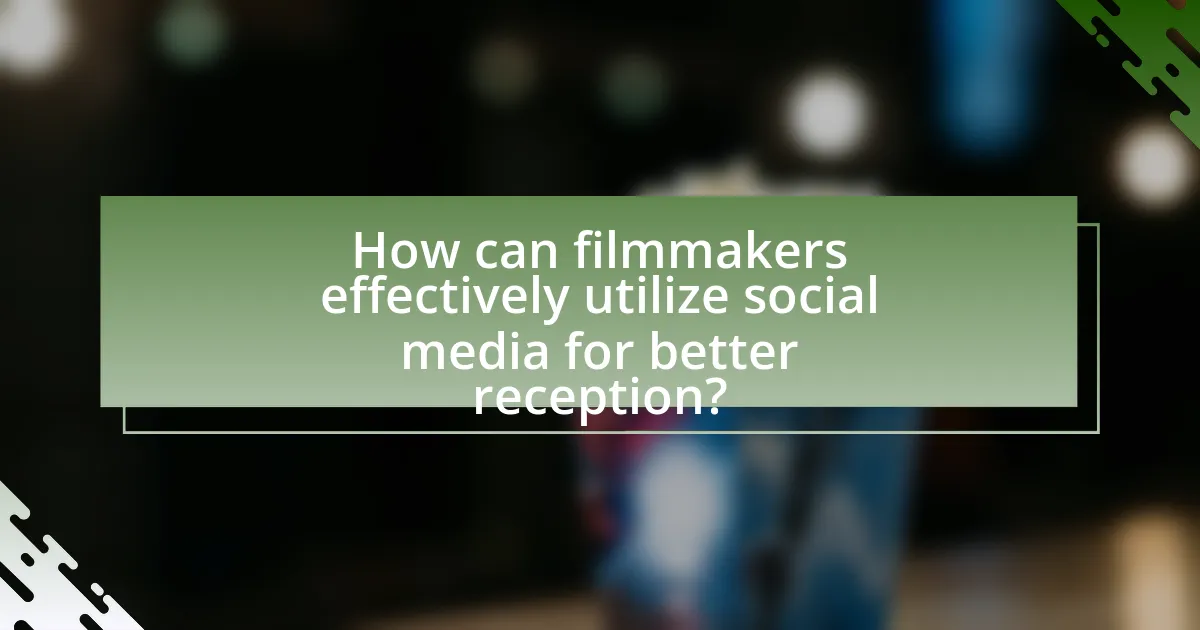
How can filmmakers effectively utilize social media for better reception?
Filmmakers can effectively utilize social media for better reception by engaging directly with their audience through targeted content and interactive campaigns. By creating behind-the-scenes footage, teasers, and engaging posts, filmmakers can build anticipation and foster a community around their projects. Research indicates that films with active social media campaigns tend to have higher box office performance; for instance, a study by the University of Southern California found that films with strong social media presence saw a 20% increase in ticket sales compared to those with minimal online engagement. Additionally, leveraging platforms like Instagram and Twitter for real-time audience interaction can enhance viewer loyalty and word-of-mouth promotion, further boosting reception.
What best practices should filmmakers follow for social media engagement?
Filmmakers should prioritize authentic storytelling and audience interaction for effective social media engagement. Authentic storytelling involves sharing behind-the-scenes content, personal anecdotes, and insights into the filmmaking process, which fosters a genuine connection with the audience. Engaging directly with followers through comments, polls, and Q&A sessions enhances community building and encourages viewer loyalty.
Research indicates that 54% of social media users prefer brands that engage with them on social platforms, highlighting the importance of interaction. Additionally, consistent posting schedules and utilizing platform-specific features, such as Instagram Stories or Twitter threads, can significantly increase visibility and engagement rates. By adhering to these best practices, filmmakers can effectively leverage social media to enhance their film’s reception and audience reach.
How can targeted campaigns enhance audience reach on social media?
Targeted campaigns enhance audience reach on social media by delivering tailored content to specific demographics, thereby increasing engagement and visibility. By utilizing data analytics, marketers can identify audience preferences and behaviors, allowing them to create personalized messages that resonate with particular groups. For instance, a study by the Pew Research Center found that targeted ads on social media can increase click-through rates by up to 50%, demonstrating the effectiveness of reaching the right audience with the right message. This strategic approach not only broadens the audience base but also fosters a deeper connection with potential viewers, ultimately influencing movie reception positively.
What content types resonate most with audiences on social media?
Visual content types, particularly videos and images, resonate most with audiences on social media. Research indicates that posts featuring videos receive 48% more views than those without, while images can increase engagement by up to 650%. Additionally, user-generated content, such as reviews and fan art, fosters community interaction and trust, further enhancing audience connection. These content types effectively capture attention and encourage sharing, making them pivotal in shaping audience perceptions and engagement on social media platforms.
What common pitfalls should filmmakers avoid in social media marketing?
Filmmakers should avoid the common pitfall of neglecting audience engagement in social media marketing. Engaging with the audience fosters a sense of community and loyalty, which is crucial for a film’s success. According to a study by the University of Southern California, films that actively engage with their audience on social media platforms see a 20% increase in box office revenue compared to those that do not. Additionally, filmmakers should refrain from over-promoting their content, as excessive self-promotion can lead to audience fatigue and disengagement. Research from the American Marketing Association indicates that balanced content, which includes behind-the-scenes insights and interactive posts, generates 60% more shares than purely promotional content. Lastly, filmmakers must avoid inconsistent branding across platforms, as a cohesive brand identity enhances recognition and trust among potential viewers.
How can negative feedback be managed on social media platforms?
Negative feedback on social media platforms can be managed by actively engaging with users, addressing their concerns, and providing timely responses. Engaging with users demonstrates that the platform values their opinions, which can mitigate negative sentiments. For instance, a study by the Pew Research Center found that 70% of users appreciate when brands respond to their feedback, indicating that responsiveness can improve public perception. Additionally, implementing a structured approach to feedback, such as categorizing issues and prioritizing responses, can enhance the effectiveness of management strategies.
What strategies can mitigate the impact of social media backlash?
To mitigate the impact of social media backlash, organizations should implement proactive communication strategies, including transparent engagement and timely responses. Proactive communication helps in addressing concerns before they escalate, while transparency builds trust with the audience. For instance, a study by the Pew Research Center found that 64% of social media users prefer brands that respond to their inquiries promptly. Additionally, monitoring social media sentiment allows organizations to identify potential issues early and adjust their messaging accordingly. By employing these strategies, organizations can effectively reduce the negative effects of backlash on their reputation and audience perception.
What are the future trends in social media’s influence on movie reception?
Future trends in social media’s influence on movie reception include increased audience engagement through interactive content and real-time feedback mechanisms. As platforms evolve, filmmakers and studios will likely leverage features like live streaming, polls, and augmented reality experiences to create immersive promotional campaigns. Additionally, the rise of influencer marketing will continue to shape audience perceptions, as endorsements from popular social media figures can significantly impact box office performance. Data from recent studies indicate that films with strong social media buzz tend to perform better, highlighting the growing importance of online sentiment analysis in predicting movie success.
How might emerging technologies change the landscape of movie marketing?
Emerging technologies will significantly transform movie marketing by enabling more personalized and interactive experiences for audiences. For instance, advancements in artificial intelligence allow marketers to analyze viewer preferences and behaviors, tailoring promotional content to individual tastes, which can increase engagement and conversion rates. Additionally, augmented reality (AR) and virtual reality (VR) technologies provide immersive experiences that can enhance audience connection with films, as seen in campaigns like the VR experiences for “Ready Player One,” which generated substantial buzz and anticipation. Furthermore, social media platforms are increasingly integrating shopping features, allowing users to purchase tickets directly through ads, streamlining the marketing process and enhancing accessibility. These technological advancements collectively create a more dynamic and effective movie marketing landscape.
What role will social media play in the evolution of audience engagement?
Social media will play a pivotal role in the evolution of audience engagement by facilitating real-time interaction and feedback between creators and viewers. This dynamic allows filmmakers to gauge audience reactions instantly, as evidenced by the fact that 54% of social media users report engaging with brands or content they discover through social platforms. Additionally, social media enables targeted marketing strategies, allowing filmmakers to reach specific demographics effectively, which can enhance audience participation and investment in the content. The ability to share opinions and reviews on platforms like Twitter and Instagram further amplifies audience voices, shaping public perception and influencing box office performance.
